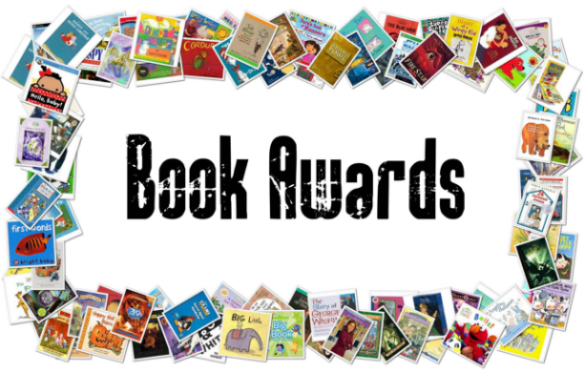
Activity: Create and upload a virtual presentation for children or young adults.
For this activity an interactive virtual presentation was created using ThingLink with the view to promote the shortlist for fiction for Years 7-9 for The Young Australians Best Book Awards (YABBA) 2016. The YABBA awards aspire to give young people a voice within the Australian Children’s book industry by encouraging children to recommend, read,rate and reward their favourite Australian books. The ThingLink platform allowed me to upload and attach to the book covers of this year’s finalists, videos of book trailers, author’s readings or discussions about each book, as well as short synopsis, excerpts or reviews. These were made visible through simply scrolling over a button on the book cover. In my view this could be an effective way to generate interest and engagement with these books by taking the viewer beyond the cover alone, and in turn encourage participation in the process of a children’s choice book award.
Children’s choice book award programs can be seen to be a successful strategy for motivating children and young adults to read. Crow (2010, p.12) suggests that this is because the programs are built on positive involvement with books, and that the more positive experiences the participants have with books the more likely they are to develop a connection with reading. This connection, explains Crow (2012, p.12) can be attributed to the transactional theory of reader response which suggests that when the readers are surrounded by, and encouraged to respond to quality books, they begin to develop personal ties with the material as they bring their own experiences to the texts as they read. Furthermore, Crow (2010, p.12) writes that once this personal bond with books is formed, the reader is likely to return to reading on their own once the program ends as there is a desire to repeat the positive experience. Encouraging an enjoyment of, and a desire to continue to read can be seen to have positive implications that may benefit individuals beyond improved literacy levels. Merga (2014, p.1), explains that whilst developing reading skills through establishing a reading habit is generally associated with higher literacy scores and reading achievement, in her view the larger benefit can be seen to be an improvement in life prospects, as improved literacy outcomes positively influence academic performance and post-school vocational outcomes.
Through this activity I learned that a young people’s book awards that encourages active involvement and allows the child to have a say can be effective in motivating children to read and fostering a love of reading. Additionally, that allowing children to aid selection may guard against the “necessary fallibility and idiosyncrasies of individual judges and judging panels” (Hately, 2012, p.197) and allow for an unbiased choice of books that young people may find a connection with. Armed with this knowledge I would endeavour to actively promote the YABBA and any other children’s choice book awards within the library. As I was researching material for my presentation I realised how unaware I was about the quality and variety of books included in these awards. This could be remedied by familiarising myself with shortlisted books so that I might best promote them and the awards.
References
Crow, S. R. (2010). Children’s Choice Book Award Programs: Effective Weapons in the Battle to Get and Keep Kids Reading. School Library Monthly, 26(9), 12-13. Retrieved from http://search.proquest.com/docview/89189790?accountid=10344
Hateley, E. (2012). And the Winner Is…?: Thinking About Australian Book Awards in the Library. The Australian Library Journal, 61(3), 189-199. doi:10.1080/00049670.2012.10736074
Merga, M. K. (2014). What would make them read more? Insights from Western Australian adolescents. Asia Pacific Journal of Education, 1-16. doi:10.1080/02188791.2014.961898

Promoting reading to young adults is an important part of our role as librarians (Preddy, 2010, pp. xv-xvi) and I found your blog interesting to read and showed some of the reasons why and how we can encourage young adults to read more. I really liked the way you used ThingLink to create an interactive tool to encourage reading for young adults.
It has been shown that as children get older they begin to stop reading as much as they did due to increasing activities. With so many entertainment options and educational demands competing for time, reading is not the highest thing on young adults minds (Owen, 2003).
Libraries and librarians are in a perfect position to promote, encourage, teach, support and engage young adults in the importance of reading.
Young adults live in a world where social media is a way of life (Braun, Martin, & Urquhart, 2010, p. 63). So where is the best place to reach them? in the online world of course. Young adults enjoy sharing their likes and dislikes with their peers and they also value the recommendations and opinions of their fellow peers.
Any way possible we can help reach young adults and encourage reading is a positive. In my blog about book awards and young adults reading I looked at a study that examined what would make young adults read more and it showed that students struggle to find books they might enjoy reading and students also commented it would be good to have resources that would assist them in finding books they might enjoy (Merga, 2014, p. 6). Therefore I thought your idea of using an interactive presentation to bring together a range of resources to encourage reading was a great way to actively promote book awards and help young adults discover new books.
References:
Braun, L. W., Martin, H. J., & Urquhart, C. (2010). Risky business: taking and managing risks in library services for teens. Chicago: American Library Association
Merga, M. K. (2014): What would make them read more? Insights from Western Australian adolescents, Asia Pacific Journal of Education, 1-16. doi:10.1080/02188791.2014.961898
Owen, M. (2003). Developing a love of reading: why young adult literature is important. Orana, 39(1), 11
Preddy, L. B. (2010). Social readers: promoting reading in the 21st centrury. Santa Barbara, California: Libraries Unlimited